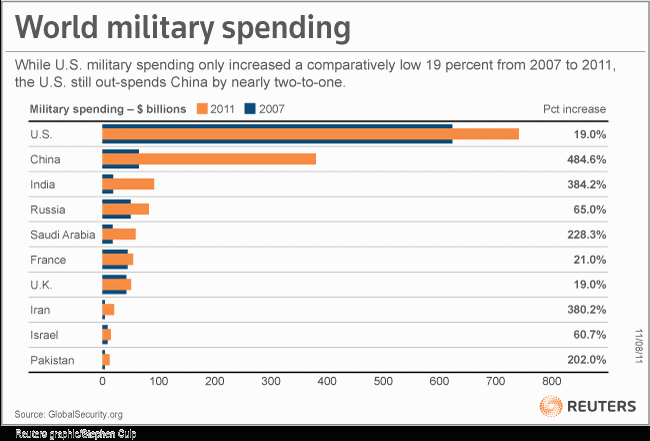15Aug11
Does the administration really want defense spending cuts?
In the upcoming Super Committee deficit reduction negotiations, most Democrats believe they must order their priorities to reflect their values and stay on message. Their first choice for debt reduction should be increased tax revenues, second would be cuts to the Pentagon’s bloated budget, and third would be cuts to domestic spending, whether discretionary or mandatory (entitlements such as Social Security and Medicare.)
Theoretically, the threat of cuts to national security spending, which will go into effect if no Super Committee deal is reached, gives Democrats leverage over hawkish Republicans to agree to increased tax revenues. Give up that leverage by saying that you’d prefer cuts to entitlement spending over cuts to the Defense Department, and you’ve given Republicans cover to claim that cutting entitlements while achieving no Democratic priorities is a fair offer.
So why would any Democrat, particularly a prominent member of the Obama administration, undercut the Democrats’ bargaining position by saying entitlement cuts are preferable to Defense cuts? It’s unclear, but that is what Defense Secretary Leon Panetta is doing.
As the Los Angeles Times reports, “Panetta said that the roughly half a trillion in additional cuts in Defense Department spending that would go into effect if Congress fails to enact a separate savings package by the end of the year would be ‘unacceptable.’ Any further defense cuts ‘is going to damage national security.’”
Later, Panetta took to his department’s web site to reiterate the point. As foreign policy expert Michael Cohen explains, “If the committee fails to reach an agreement and across-the-board defense cuts are immediately put into effect Republicans can use a Democratic Secretary of Defense’s own words to argue that Congressional Democrats have weakened national security.”
This isn’t just a matter of petty politics. For Panetta to claim that Defense cannot afford to cut spending, and to even go so far as spooking Americans with ominous warnings of “damage” to national security, resembles fear-mongering normally associated with the political right.
The facts do not support his claim. The U.S. spends more than four times as much in absolute dollars, never mind per capita, than its nearest competitor, China. Just behind China rank longstanding U.S. allies such as the United Kingdom (third) and France (fourth).

So Panetta resorted to reviving the old Axis of Evil to argue against spending cuts, citing the threat of Iran or North Korea developing nuclear weapons. “We need to continue to watch them closely,” Panetta said.
That might be the case, but it’s also irrelevant to the way that we actually spend our military dollars. Defense spending increased 70 percent under George W. Bush. As we now wind down the “Global War on Terror,” reducing our troop presence in Iraq and Afghanistan to focus on more efficacious targeted anti-terrorist operations, we should reap cost savings, as we did after World War II and, for a time, the Cold War. That’s why, as the Center for American Progress explains in a July report, we could save $250 billion to $300 billion annually by reducing our spending to the levels we saw under Presidents Eisenhower, Clinton and George H.W. Bush. Is Panetta, a former Clinton White House chief of staff, suggesting that those presidents exposed us to unacceptable security risks by under-spending?
Moreover, why does watching Iran and North Korea require us to station over 500,000 troops in over 150 countries? Our global troop presence contains such anachronisms as more than 50,000 troops stationed in Germany, just in case the Soviet Union reconstitutes itself and invades Western Europe. The notion that we cannot afford to remove some of those troops or cut a few weapons systems without putting our national security at risk is ludicrous.
If anything, our military adventurism may make us more vulnerable, rather than less so, to the security risks of the modern era. As September 11 demonstrated, our massive military presence in foreign countries such as Saudi Arabia can actually increase the threat of attack from non-state actors.
Curiously, Obama has sent signals that he agrees with Panetta. “Last week we reached an historic agreement — reached an agreement that weill make historic cuts to defense and domestic spending,”Obama said in early August. “But there’s not much further that we can cut in either of those categories. What we need to do now is combine those spending cuts with two additional steps: tax reform that will ask those who can afford it to pay their fair share and modest adjustments to health care programs like Medicare.”
Of course any ideal agreement will lower the trajectory of health care spending, but that isn’t mutually exclusive with trimming fat at the Pentagon. Obama’s own bipartisan deficit reduction commission endorsed doing both. So why is the Obama administration under-cutting its own bargaining position and the whole purpose of the Super Committee, which is to use the threat of military cuts to bring Republicans to the table?
Obama has consistently shown himself to be a pusillanimous and ineffective negotiator, but this is remarkable even by his low standards. It’s now up to Democrats to pressure their own administration or risk getting rolled in the Super Committee like they did in the deal to raise the debt ceiling that created the committee in the first place.
[Source: By Ben Adler, Reuters, 15Aug11]
